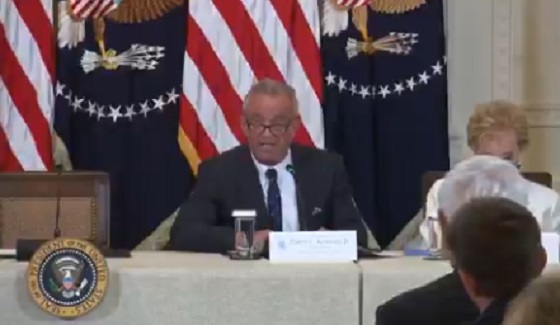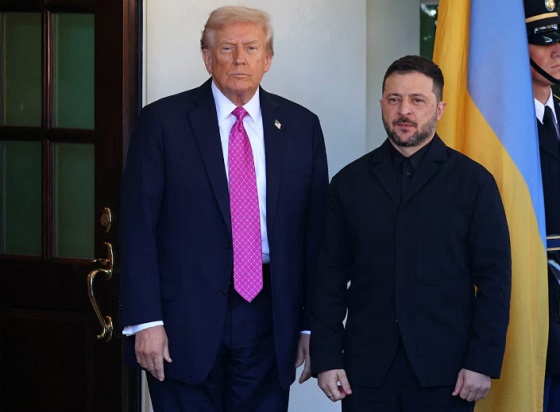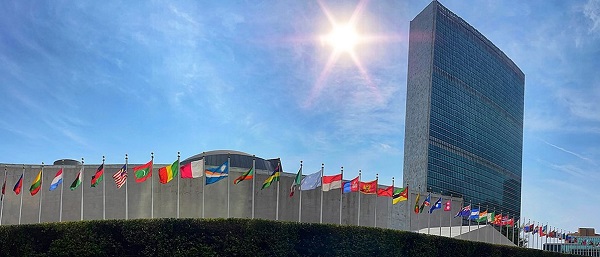Health
MAHA report: Chemicals, screens, and shots—what’s really behind the surge in sick kids

 MxM News
MxM News
Quick Hit:
Health Secretary RFK Jr. released a new report Thursday blaming diet, chemicals, inactivity, and overmedication for chronic illnesses now impacting 40% of U.S. children.
Key Details:
-
The Make America Healthy Again (MAHA) Commission report identified four primary culprits: ultra-processed diets, environmental chemicals, sedentary lifestyles, and overreliance on pharmaceuticals.
-
The commission called for renewed scrutiny of vaccine safety, arguing there has been “limited scientific inquiry” into links between immunizations and chronic illness.
-
President Trump called the findings “alarming” and pledged to take on entrenched interests: “We will not be silenced or intimidated by corporate lobbyists or special interests.”
"Our children's bodies are being besieged," says @SecKennedy on the new MAHA Report.
"These root cause factors are at the foundation of what's driving the chronic disease crisis — but until today, the government didn't speak about them." pic.twitter.com/dhF9wEUJGg
— Rapid Response 47 (@RapidResponse47) May 22, 2025
Diving Deeper:
On Thursday, Health and Human Services Secretary Robert F. Kennedy Jr. released a long-anticipated report from the Make America Healthy Again (MAHA) Commission, outlining what the Trump administration sees as the root causes of the chronic disease epidemic among American children. The commission concluded that roughly 40% of U.S. children now suffer from some form of persistent health issue, including obesity, autism, mental health disorders, and autoimmune diseases.
The report identifies four leading contributors: poor nutrition, chemical exposure, lack of physical activity and time outdoors, and overmedicalization of childhood ailments. One of the most alarming statistics cited is the extent to which children’s diets are now composed of what the commission called “ultra-processed foods” (UPFs), with 70% of a typical child’s diet made up of high-calorie, low-nutrient products that contain additives like artificial dyes, sweeteners, preservatives, and engineered fats.
“Whole foods grown and raised by American farmers must be the cornerstone of our children’s healthcare,” the commission urged. It also criticized government-supported programs like school lunches and food stamps for failing to encourage healthy choices, while noting that countries like Italy and Portugal have far lower consumption of UPFs.
The report also raised red flags about widespread chemical exposure through water, air, household items, and personal products. Items of concern included nonstick cookware, pesticides, cleaning supplies, and even fluoride in the water system. The commission referenced research indicating a 50% increase in microplastics found in human brain tissue between 2016 and 2024. It recommended that the U.S. lead in developing AI tools to monitor and mitigate chemical exposure.
Electromagnetic radiation from devices such as phones and laptops was also flagged as a potential contributor to rising disease rates, alongside a marked drop in physical activity among youth. Data cited from the American Heart Association shows 60% of adolescents aged 12-15 do not meet healthy cardiovascular benchmarks, and the majority of children aged 6-17 do not meet federal exercise guidelines.
The commission also tackled what it called a dangerous trend of overmedicating children without considering environmental or lifestyle factors first. Roughly 20% of U.S. children are on at least one prescription medication, including for ADHD, anxiety, and depression.
The commission specifically called out the American Medical Association’s recent stance on curbing health “disinformation,” arguing that it suppresses legitimate inquiry into vaccine safety and efficacy. It further noted that over half of European countries do not mandate vaccinations for school attendance, unlike all 50 U.S. states.
Trump, who established the MAHA Commission by executive order in February, signaled full support for Kennedy’s findings. “In some cases, it won’t be nice or it won’t be pretty, but we have to do it,” he said. “We will not stop until we defeat the chronic disease epidemic in America.”
Policy recommendations based on the report are expected to be delivered to President Trump by August. Among the initial proposals are expanded surveillance of pediatric prescriptions, creation of a national lifestyle trial program, and a new AI-driven system to detect early signs of chronic illness in children.
Business
Cutting Red Tape Could Help Solve Canada’s Doctor Crisis

From the Frontier Centre for Public Policy
By Ian Madsen
Doctors waste millions of hours on useless admin. It’s enough to end Canada’s doctor shortage. Ian Madsen says slashing red tape, not just recruiting, is the fastest fix for the clogged system.
Doctors spend more time on paperwork than on patients and that’s fueling Canada’s health care wait lists
Canada doesn’t just lack doctors—it squanders the ones it has. Mountains of paperwork and pointless admin chew up tens of millions of physician hours every year, time that could erase the so-called shortage and slash wait lists if freed for patient care.
Recruiting more doctors helps, but the fastest cure for our sick system is cutting the bureaucracy that strangles the ones already here.
The Canadian Medical Association found that unnecessary non-patient work consumes millions of hours annually. That’s the equivalent of 50.5 million patient visits, enough to give every Canadian at least one appointment and likely erase the physician shortage. Meanwhile, the Canadian Institute for Health Information estimates more than six million Canadians don’t even have a family doctor. That’s roughly one in six of us.
And it’s not just patients who feel the shortage—doctors themselves are paying the price. Endless forms don’t just waste time; they drive doctors out of the profession. Burned out and frustrated, many cut their hours or leave entirely. And the foreign doctors that health authorities are trying to recruit? They might think twice once they discover how much time Canadian physicians spend on paperwork that adds nothing to patient care.
But freeing doctors from forms isn’t as simple as shredding them. Someone has to build systems that reduce, rather than add to, the workload. And that’s where things get tricky. Trimming red tape usually means more Information Technology (IT), and big software projects have a well-earned reputation for spiralling in cost.
Bent Flyvbjerg, the global guru of project disasters, and his colleagues examined more than 5,000 IT projects in a 2022 study. They found outcomes didn’t follow a neat bell curve but a “power-law” distribution, meaning costs don’t just rise steadily, they explode in a fat tail of nasty surprises as variables multiply.
Oxford University and McKinsey offered equally bleak news. Their joint study concluded: “On average, large IT projects run 45 per cent over budget and seven per cent over time while delivering 56 per cent less value than predicted.” If that sounds familiar, it should. Canada’s Phoenix federal payroll fiasco—the payroll software introduced by Ottawa that left tens of thousands of federal workers underpaid or unpaid—is a cautionary tale etched into the national memory.
The lesson isn’t to avoid technology, but to get it right. Canada can’t sidestep the digital route. The question is whether we adapt what others have built or design our own. One option is borrowing from the U.S. or U.K., where electronic health record (EHR) systems (the digital patient files used by doctors and hospitals) are already in place. Both countries have had headaches with their systems, thanks to legal and regulatory differences. But there are signs of progress.
The U.K. is experimenting with artificial intelligence to lighten the administrative load, and a joint U.K.-U.S. study gives a glimpse of what’s possible:
“… AI technologies such as Robotic Process Automation (RPA), predictive analytics, and Natural Language Processing (NLP) are transforming health care administration. RPA and AI-driven software applications are revolutionizing health care administration by automating routine tasks such as appointment scheduling, billing, and documentation. By handling repetitive, rule-based tasks with speed and accuracy, these technologies minimize errors, reduce administrative burden, and enhance overall operational efficiency.”
For patients, that could mean fewer missed referrals, faster follow-up calls and less time waiting for paperwork to clear before treatment. Still, even the best tools come with limits. Systems differ, and customization will drive up costs. But medicine is medicine, and AI tools can bridge more gaps than you might think.
Run the math. If each “freed” patient visit is worth just $20—a conservative figure for the value of a basic appointment—the payoff could hit $1 billion in a single year.
Updating costs would continue, but that’s still cheap compared to the human and financial toll of endless wait lists. Cost-sharing between provinces, Ottawa, municipalities and even doctors themselves could spread the risk. Competitive bidding, with honest budgets and realistic timelines, is non-negotiable if we want to dodge another Phoenix-sized fiasco.
The alternative—clinging to our current dysfunctional patchwork of physician information systems—isn’t really an option. It means more frustrated doctors walking away, fewer new ones coming in, and Canadians left to languish on wait lists that grow ever longer.
And that’s not health care—it’s managed decline.
Ian Madsen is a senior policy analyst at the Frontier Centre for Public Policy.
Addictions
BC premier admits decriminalizing drugs was ‘not the right policy’

From LifeSiteNews
Premier David Eby acknowledged that British Columbia’s liberal policy on hard drugs ‘became was a permissive structure that … resulted in really unhappy consequences.’
The Premier of Canada’s most drug-permissive province admitted that allowing the decriminalization of hard drugs in British Columbia via a federal pilot program was a mistake.
Speaking at a luncheon organized by the Urban Development Institute last week in Vancouver, British Columbia, Premier David Eby said, “I was wrong … it was not the right policy.”
Eby said that allowing hard drug users not to be fined for possession was “not the right policy.
“What it became was a permissive structure that … resulted in really unhappy consequences,” he noted, as captured by Western Standard’s Jarryd Jäger.
LifeSiteNews reported that the British Columbia government decided to stop a so-called “safe supply” free drug program in light of a report revealing many of the hard drugs distributed via pharmacies were resold on the black market.
Last year, the Liberal government was forced to end a three-year drug decriminalizing experiment, the brainchild of former Prime Minister Justin Trudeau’s government, in British Columbia that allowed people to have small amounts of cocaine and other hard drugs. However, public complaints about social disorder went through the roof during the experiment.
This is not the first time that Eby has admitted he was wrong.
Trudeau’s loose drug initiatives were deemed such a disaster in British Columbia that Eby’s government asked Trudeau to re-criminalize narcotic use in public spaces, a request that was granted.
Records show that the Liberal government has spent approximately $820 million from 2017 to 2022 on its Canadian Drugs and Substances Strategy. However, even Canada’s own Department of Health in a 2023 report admitted that the Liberals’ drug program only had “minimal” results.
Official figures show that overdoses went up during the decriminalization trial, with 3,313 deaths over 15 months, compared with 2,843 in the same time frame before drugs were temporarily legalized.
-

 Business2 days ago
Business2 days agoFord’s Whisky War
-

 Agriculture17 hours ago
Agriculture17 hours agoIs the CFIA a Rogue Agency or Just Taking Orders from a Rogue Federal Government?
-

 Focal Points2 days ago
Focal Points2 days agoTrump Walks Back His Tomahawk Tease from Zelensky
-

 Automotive2 days ago
Automotive2 days ago$15 Billion, Zero Assurances: Stellantis Abandons Brampton as Trudeau-Era Green Deal Collapses
-

 Business1 day ago
Business1 day agoTrump Blocks UN’s Back Door Carbon Tax
-

 Business1 day ago
Business1 day agoJudges are Remaking Constitutional Law, Not Applying it – and Canadians’ Property Rights are Part of the Collateral Damage
-

 Red Deer1 day ago
Red Deer1 day agoYour last minute election prep: Common Sense Red Deer talks to the candidates
-

 Business1 day ago
Business1 day agoTrump Admin Blows Up UN ‘Global Green New Scam’ Tax Push, Forcing Pullback






